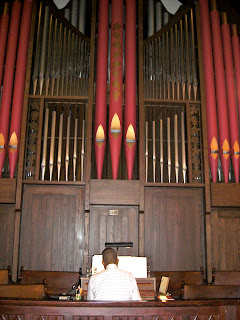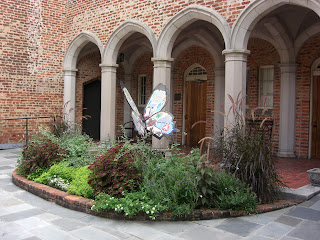My friend and I experienced sweat and goosebumps close together, on a hot Alabama July day.
Don't worry it wasn't the flu, it was the civil rights movement, and a resulting providential meeting many years later in 2012.
We were touring Selma last summer, after reading the book Marching for Freedom, by Elizabeth Partridge.
I learned two things from reading that book. One, I honestly didn't realize that white people were involved in the civil rights movement. Also, I'd never heard about the prominent role of music in the whole thing.
From the Author's Website:
Marching for Freedom: Walk Together, Children, and Don't You Grow Weary tells the unsettling but uplifting story of the Selma to Montgomery March in 1965, using the voices of men and women who participated as children and teenagers... Italicized lyrics to “freedom songs” are woven throughout, emphasizing the power drawn from music. Powerful duotone photographs, which range from disturbing to triumphal, showcase the determination of these civil rights pioneers. Publishers Weekly, starred review
Other reviewers comment on the extraordinary selection of photographs, and how they especially complement the text. After checking out photographers' archives and other research, and traveling to Selma to interview people who had been children and in their teens at the time they participated, the author says that when she found out what she did she wanted to "jump up on my roof and yell: have you heard about this?"
People think the civil rights movement is because of Gandhi. He gave Martin Luther King the idea of non-violent resistance, and the whole thing happened. That's not quite so.
Gandhi and King met at a strategic time certainly -- when the movement for civil rights was at a certain point. The ideas and inspiration that came from their meeting is undeniable, but Gandhi wasn't responsible for the whole thing.
Research and read King's own words and life, and you'll see that inspiration came from elsewhere. I'm not trying to convince anyone of this. It happened or it didn't. The information can be checked out. "But it's a matter of interpretation," one might say. But is it? Is history a matter of interpretation? Sure, we all bring our lens of life-perspective to history; but purposely, it can be and needs to be studied with alacrity, to define and find out what really happened. And yes, this is possible. Because it happened, and in a certain way.
King was inspired and led by God. I think in utter fact, that God of course led him to Gandhi. Their meeting was perfectly timed and propitious.
But that meeting was only one bead in a long string.
***
Why do we hesitate to give God credit for the civil rights movement?
* Because we can't see God?
* Because if we do, it doesn't feel right because we (people) don't get (enough) credit and so then how are we important at all -- we human beings?
* Because we don't believe in God? So if we don't, then we can't acknowledge or give credit to something that doesn't exist (in our opinion).
We have wrong assumptions and understanding about our partnership with God. We think that if we give God credit, then we're worse than nothing. We (or others) get no credit and are invisible. Whereas, if our understanding of God involves that God is Love -- then it all begins to make more sense. Just as we'd be inspired by something that a friend says, that helps and guides us -- because it's true, and because we know they care for us. This is the kind of thing I'm talking about.
***
So, back to Selma.
For different reasons, for my friend and I this trip made sense and we were both excited about it.
Our arrival into Selma was less than impressive.
We stopped first at a gas station after dark, where bars on the windows and a fiberglass box completely surrounding the cashier, did not put our minds at ease. There was a little slot cut in the fiberglass where money could change hands. Standing in line with my chocolate bar, in front of me was a young boy buying a handful of candy from several plastic bins set out near the counter. This made me feel a little bit better.
The next morning, after finding a brochure in the hotel about the "Churches of Selma" we set out exploring.
At a certain time in its past, the city was prosperous. Building materials were brought in by boat to complete an impressive number of architecturally beautiful churches. We drove around in our minivan, working our way through the brochure and taking pictures.
The first church we visited was sadly in disrepair:
 |
| Photo by Ginger Davis |
 |
| Photo by Ginger Davis |
But each one was different from the next, with their own unique and beautiful architectural elements.
 |
| Photo by Ginger Davis |
As we met up to determine our next move, walking briskly along the sidewalk came a trim, petite lady with short white hair, listening to a portable CD player. I think my friend with her friendly face must've caught Sarah's eye (as we came to know her name). Before we knew it, we were all chatting about why we were in town, the Marching for Freedom book, the connection between music and God and the civil rights movement -- and then Sarah invited us in.
She was the organist for the Presbyterian church we were standing in front of. We felt so thankful. The heat, the travel to get there, the locked doors up until that point. So she unlocked, and led us into the cool sanctuary. While we were glancing around appreciatively, she thought of her other organist friend who might be across the street practicing at the Episcopal church. She gave him a quick call and he was there. He was there, and willing to let us in to see that building as well. But briefly because he had to leave for a doctor's appointment.
So we hustled down and met Mr. Quentin Lane -- who it turns out played for Dr. King and the others, during the civil rights movement.
We were speechless for a minute - standing awed and looking around the sanctuary - dim compared to the outside, and blessedly cold. Glowing stained glass curved around the walls of the central room. Pews stretched out in a semi-circle from where we stood at the front.


Hoping that Mr. Lane was still practicing, I asked if we could hear him play. He gracefully obliged, quickly changed his shoes (I didn't know organist's did this, it's so they can feel the pedals) and began.
I told a friend later, "I thought all the atoms in my body would sink through the floor."
Let me say at this point, I hadn't previously gotten into organ music. In my experience, I thought it sounded sort of fuzzy to me, and too loud.
Not this.
Maybe it was the parts of songs he chose, maybe it was the particular musician, maybe it was the effect of the environment.
Maybe it was our focus on the price, the cost of the marching ... the faithfulness and guidance of God ... to freedom.
Because that's exactly what I've personally experienced: knowing, unequivocally and outside of myself, that God cares for and loves me, that he paid the price to set me free -- and that gives courage. There's nothing to lose, and love to share and souls to gain. Yes, it's politically incorrect, but I'm going to say it: Souls to Gain.
"How dare you say to someone that their soul is lost?!" Well isn't it? Mine was.
I didn't know who I was, how I mattered, what my purpose was. And that wasn't because of bad parents either.
It was because as a created being, I needed to know my Creator. I needed to know that I mattered because I was created by a loving One.
Use the Parent analogy if need be. Each person is precious, but we don't realize that fully unless we know the One who is so much bigger than us, who knows that we are precious.
This all ties in with the courage, resolve and almost insane fortitude that was required of those walking, step-by-step from Selma to Montgomery during that time in 1965.
Many of those people, if not most, knew their worth in Christ, as we say. This deep, thorough knowledge counteracted the taunts, the insults, the physical violence. It was the only thing that could.
The civil rights movement wasn't a protest movement. Because one can't protest something, and expect someone else to be convinced of anything. People thought color of skin meant some things it didn't. It wasn't like people knew what they were doing was wrong, and needed someone to wave a placard in their face and they'd change their mind.
Instead, it was a demonstration of the truth. Quietly singing. Walking, to bring attention. There was enough violence and anger already. More of that wasn't needed or powerful. Yes, anger at injustice is different. I imagine how hard it would've been, to resist wanting to beat up on someone who was beating up on yourself, your friend, sister, mother, father, neighbor. How EASY to hate them, to want to kill them, to feel the anger surge up and give you energy to harm.
How do you explain someone in this environment, being able to keep calmly walking, or even wanting to?!
A different perspective, and a different Spirit.
So, Quentin played a bit of an Easter song, a bit of [something else], and then a few bars of "We Shall Overcome."
I'd never heard that music before.
I'd heard of it, and vaguely but certainly (the way those things happen in your mind without you realizing), thought it was march music. Something along the lines of "Onward, Christian Soldier" (Marching as to War).
Nope.
It flows and surges. Like a deep, strong river. Ineffable, inexorable as huge volumes of water.
This.
This - was where the strength came from. The wisdom, the patience.
"Then the angel showed me the river of the water of life, [clear and] bright as crystal, flowing from the throne of God and of the Lamb..." (Revelation 22.1 ESV)
 |
| Photo by Ginger Davis |
When asked about experiencing that time, Mr. Lane said something to the effect that it was part of a whole. A few days in the context of a year, and then the many following years. There were defining moments in those few days, certainly, but it wasn't everything. Growing up in Selma and now living back there, he mentioned that he's always had friends from different backgrounds. Also in the music world, art and vocation unify. A woman who wanted to help in some way, after seeing the shocking, sad collection of incidents on Bloody Sunday, eventually paid for Mr. Lane's music school tuition.
 |
| Photo by Ginger Davis |
Opening a wide, low, hobbit-like door, we left from a small hall behind the floor-to-ceiling organ.
Deeply thankful and appreciative.
Read more about Mr. Lane's life here.








No comments:
Post a Comment